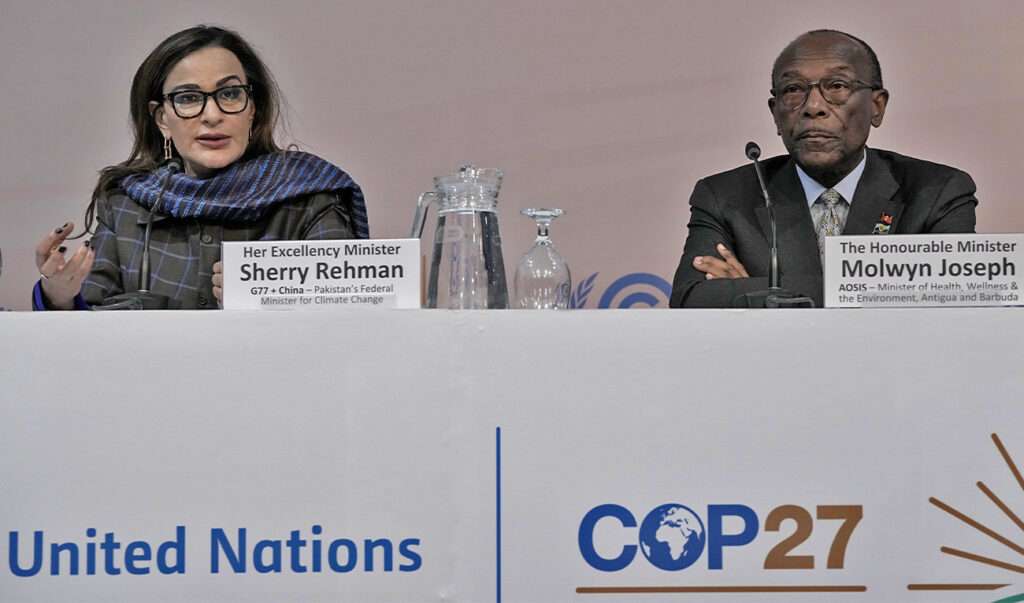Recently, we saw Climate Change Minister Sherry Rehman emerge as a strong proponent for climate justice. The UN Climate Change Conference COP27 in Sharm el-Sheikh, Egypt, saw her as a vocal advocate standing for Pakistan. Calling other countries to rethink their lifestyles, highlighting the vulnerable position of Pakistan and its inability in tolerating this dystopia, she defended her stance well. The several discussions that were held at the conference mainly focused on goals for Climate Change Mitigation, Adaptation, Finance, and Collaboration.
One of the most vital outcomes of the conference has been the establishment of a ‘loss and damage’ fund. This was achieved after intense negotiations amongst nearly 200 countries in the two-week conference. The fund will support developing countries affected by climate change crises.
Although the agreement for establishing the fund has been made, the mechanism and processes are yet to be concluded. Striving for climate justice, especially carbon emissions from rich countries adversely affecting the developing world, remain a conundrum.
Before becoming Pakistan’s Climate Change Minister, Sherry Rehman had a formidable career as a ‘Senator, civil society activist, diplomat, and a seasoned journalist,’ along with heading the Ministries of Health, Women Development, and Culture.
At the conference, our Minister told the world how a third of the country was submerged in water due to the devastating floods this year. The World Bank estimates that 33 million were displaced and almost 2000 people were killed. As the fifth most populous country in the world and the second largest nation in South Asia, Pakistan continues to absorb the ripple effect of climate chaos.
To address the global mitigation efforts at COP27, Sherry Rehman was featured in various discussions. Some of these included The Climate Emergency is a Hunger Emergency: Scaling-up Climate Change Adaptation and Solutions to Address Loss and Damage in Food Systems, Turning Financing Commitments into Net-Zero Action in Asia-Pacific, gearing towards carbon neutrality/net-zero in the Asia-Pacific Region, as well as Loss and Damage: From Intention to Action COP27 (session hosted by the Ministry of Climate Change, Pakistan).

She also represented Pakistan at the ‘High-Level Event on the Climate Finance Needs of Developing Countries.’ The Pakistani Pavilion itself used the slogan “What happens in Pakistan will not stay in Pakistan”, to highlight the damages caused by the floods, hosting 22 events; several were full house sessions.
Presiding over G77, Pakistan has unified the efforts of developing nations and used its experience of the flood devastation to urge the establishment of the ‘loss and damage’ fund. Pakistan’s efforts were applauded by the German Minister for Economic Cooperation and Development, Svenja Schultz. Pakistan was also declared to be a “pathfinder” for the Global Shield against Climate Action.
Minister Sherry Rehman has also been named one of the ‘25 most influential women in the world’ by the Financial Times (FT). It seems her passion for social activism is being hailed by world leaders; being termed a “negotiator with grit”, in FT. One has to admire her tenacity and boldness in handling situations, making her mark as a woman in this world. Quoted as wryly saying “If women were leading the world, we would have less stress from the climate and I’m quite sure, solutions would be found faster than us just talking about it.”
Sherry Rehman’s career path and status are a morale booster for several women in Pakistan. A country where besides the subordinate gender roles embedded for women in society, there remains a vast potential to excel – but is not granted. The determination and excellence which she has brought through her diverse endeavors have been acknowledged by the global community. Perhaps we as a nation can emulate such change-makers and follow in their lead.





